An Analysis of Leadership and Operations Management at M&S Retail
VerifiedAdded on 2020/07/22
|13
|4381
|59
Report
AI Summary
This report delves into the intricacies of leadership and operations management within the context of M&S, a retail clothing industry. The introduction defines operations management and its significance in achieving organizational goals, while the first task compares the roles and characteristics of leaders and managers, highlighting their differences and similarities. It explores various leadership theories like trait, behavioral, and situational theories, evaluating their impact on the roles of leaders and managers. The report further examines the practical application of leadership and management in diverse situations, such as goal setting, organizing, and motivating employees. It also discusses the strengths and weaknesses of the situational approach. The second task focuses on operations management, the roles of leaders and managers in improving efficiency, and the environmental factors influencing them. The report concludes by summarizing the key findings and providing relevant references, offering a comprehensive analysis of leadership and operational effectiveness within M&S.
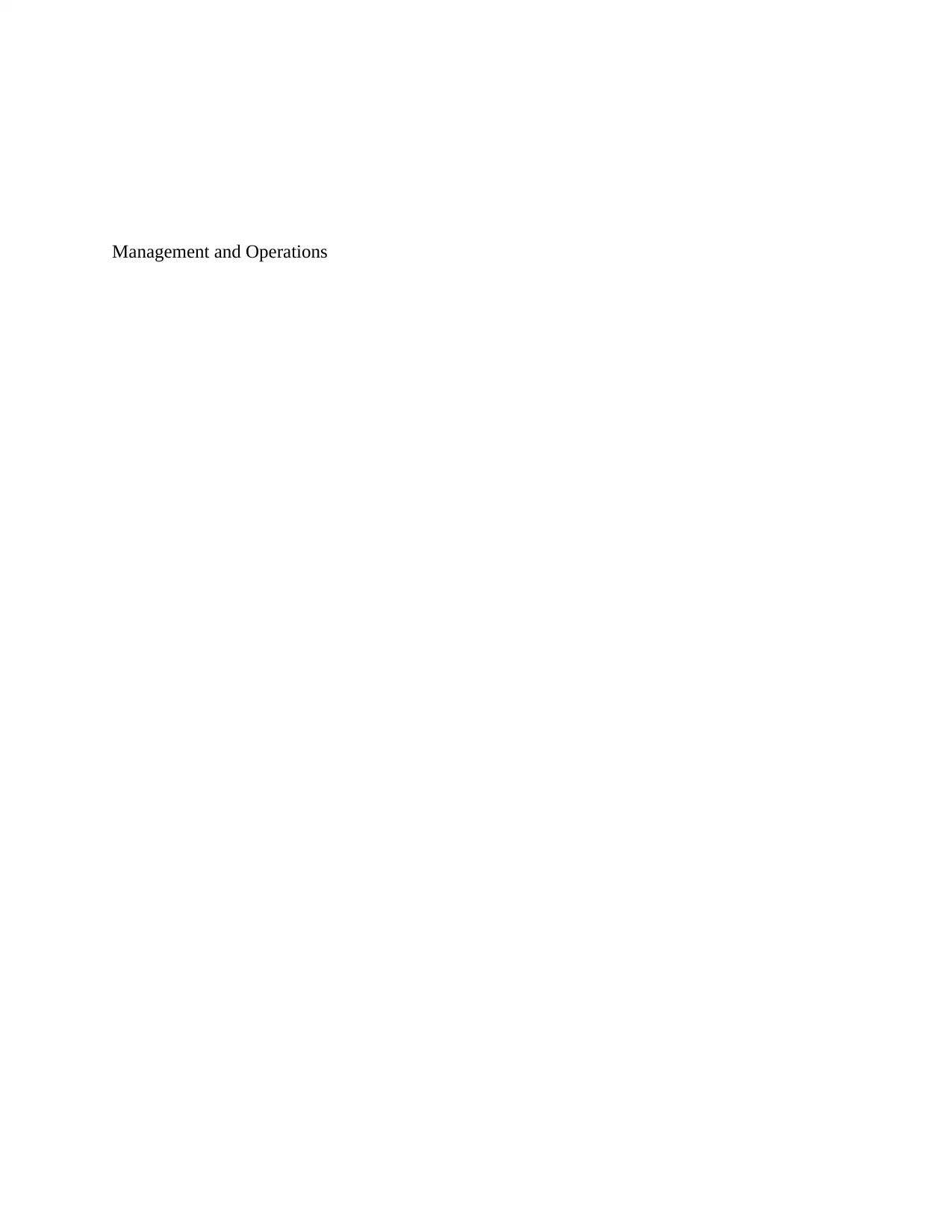
Management and Operations
Paraphrase This Document
Need a fresh take? Get an instant paraphrase of this document with our AI Paraphraser
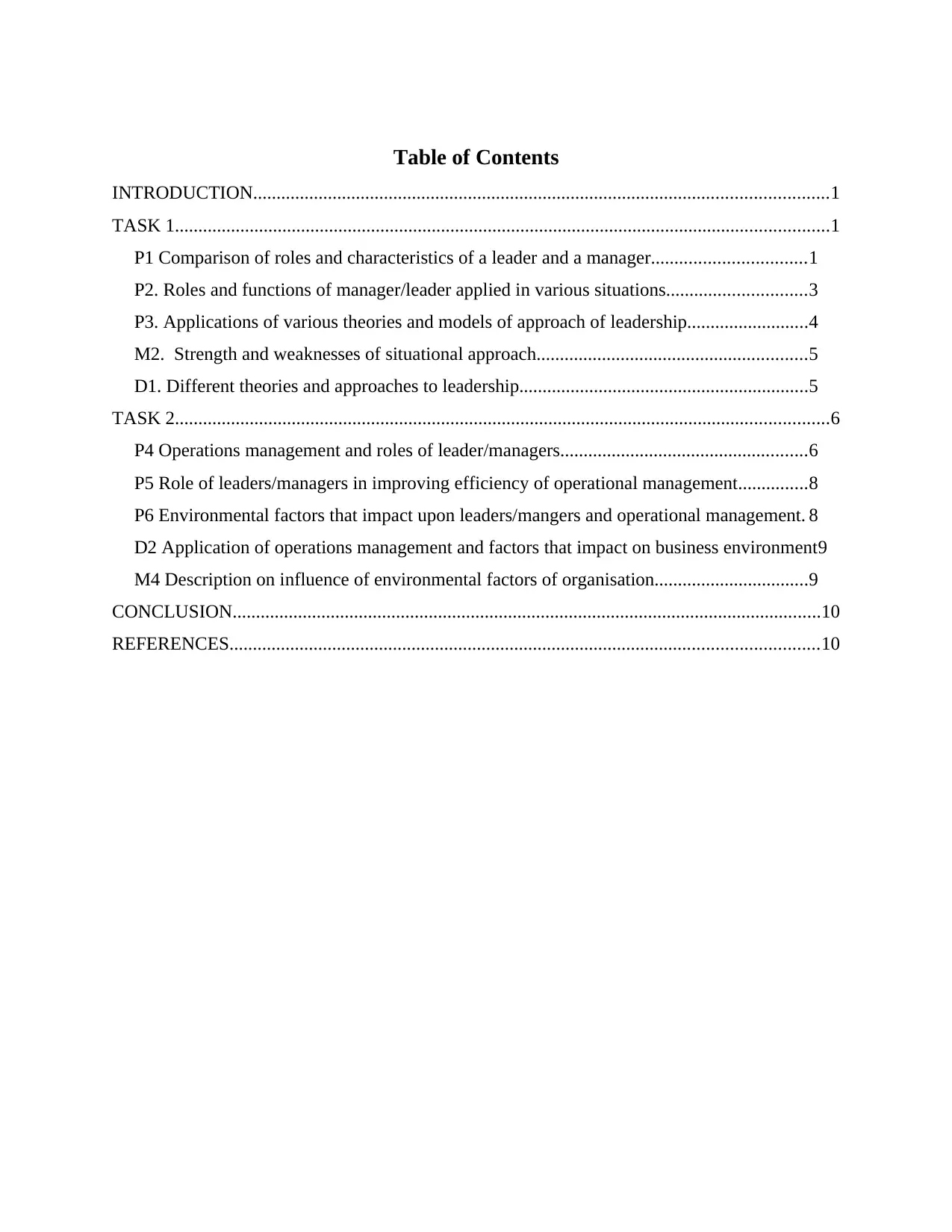
Table of Contents
INTRODUCTION...........................................................................................................................1
TASK 1............................................................................................................................................1
P1 Comparison of roles and characteristics of a leader and a manager.................................1
P2. Roles and functions of manager/leader applied in various situations..............................3
P3. Applications of various theories and models of approach of leadership..........................4
M2. Strength and weaknesses of situational approach..........................................................5
D1. Different theories and approaches to leadership..............................................................5
TASK 2............................................................................................................................................6
P4 Operations management and roles of leader/managers.....................................................6
P5 Role of leaders/managers in improving efficiency of operational management...............8
P6 Environmental factors that impact upon leaders/mangers and operational management. 8
D2 Application of operations management and factors that impact on business environment9
M4 Description on influence of environmental factors of organisation.................................9
CONCLUSION..............................................................................................................................10
REFERENCES..............................................................................................................................10
INTRODUCTION...........................................................................................................................1
TASK 1............................................................................................................................................1
P1 Comparison of roles and characteristics of a leader and a manager.................................1
P2. Roles and functions of manager/leader applied in various situations..............................3
P3. Applications of various theories and models of approach of leadership..........................4
M2. Strength and weaknesses of situational approach..........................................................5
D1. Different theories and approaches to leadership..............................................................5
TASK 2............................................................................................................................................6
P4 Operations management and roles of leader/managers.....................................................6
P5 Role of leaders/managers in improving efficiency of operational management...............8
P6 Environmental factors that impact upon leaders/mangers and operational management. 8
D2 Application of operations management and factors that impact on business environment9
M4 Description on influence of environmental factors of organisation.................................9
CONCLUSION..............................................................................................................................10
REFERENCES..............................................................................................................................10
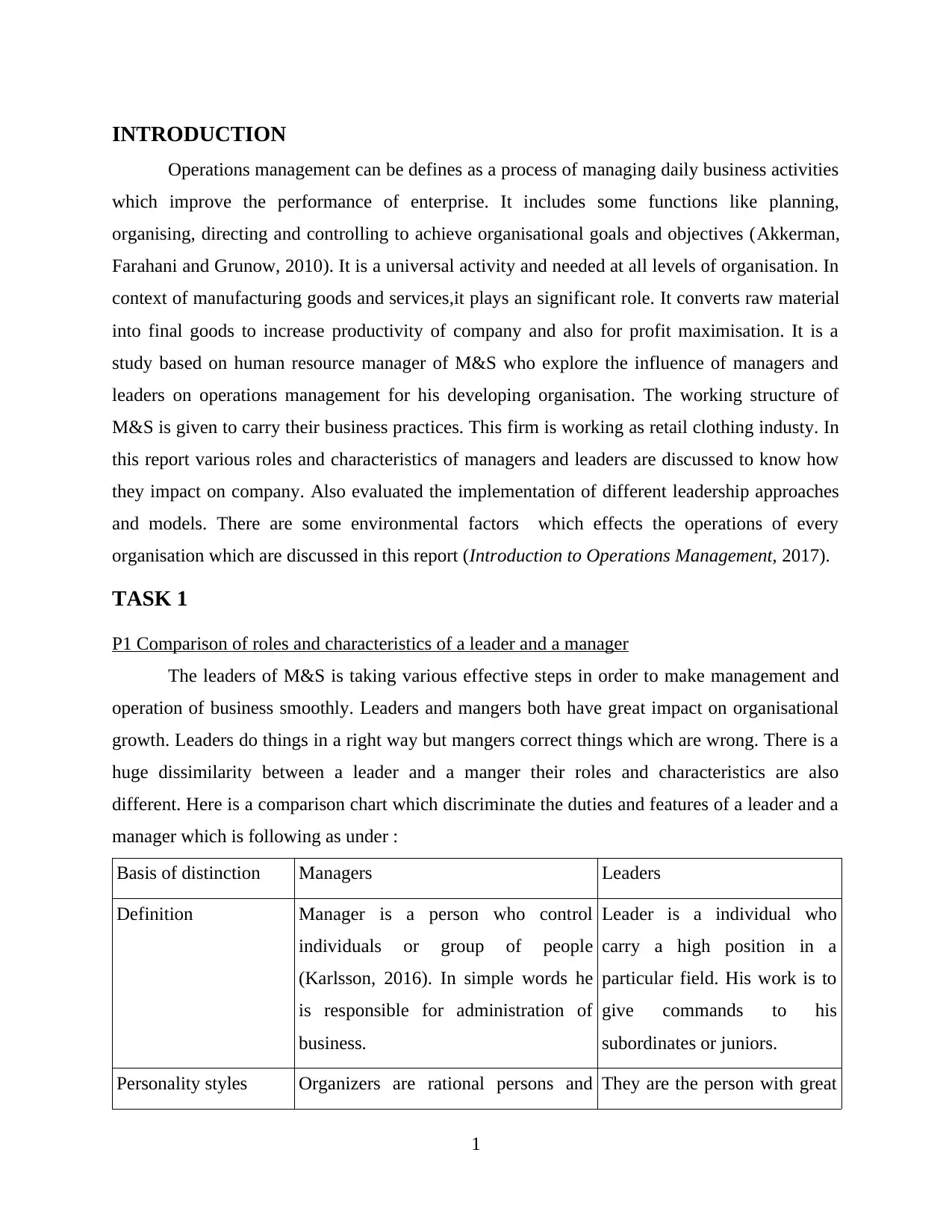
INTRODUCTION
Operations management can be defines as a process of managing daily business activities
which improve the performance of enterprise. It includes some functions like planning,
organising, directing and controlling to achieve organisational goals and objectives (Akkerman,
Farahani and Grunow, 2010). It is a universal activity and needed at all levels of organisation. In
context of manufacturing goods and services,it plays an significant role. It converts raw material
into final goods to increase productivity of company and also for profit maximisation. It is a
study based on human resource manager of M&S who explore the influence of managers and
leaders on operations management for his developing organisation. The working structure of
M&S is given to carry their business practices. This firm is working as retail clothing industy. In
this report various roles and characteristics of managers and leaders are discussed to know how
they impact on company. Also evaluated the implementation of different leadership approaches
and models. There are some environmental factors which effects the operations of every
organisation which are discussed in this report (Introduction to Operations Management, 2017).
TASK 1
P1 Comparison of roles and characteristics of a leader and a manager
The leaders of M&S is taking various effective steps in order to make management and
operation of business smoothly. Leaders and mangers both have great impact on organisational
growth. Leaders do things in a right way but mangers correct things which are wrong. There is a
huge dissimilarity between a leader and a manger their roles and characteristics are also
different. Here is a comparison chart which discriminate the duties and features of a leader and a
manager which is following as under :
Basis of distinction Managers Leaders
Definition Manager is a person who control
individuals or group of people
(Karlsson, 2016). In simple words he
is responsible for administration of
business.
Leader is a individual who
carry a high position in a
particular field. His work is to
give commands to his
subordinates or juniors.
Personality styles Organizers are rational persons and They are the person with great
1
Operations management can be defines as a process of managing daily business activities
which improve the performance of enterprise. It includes some functions like planning,
organising, directing and controlling to achieve organisational goals and objectives (Akkerman,
Farahani and Grunow, 2010). It is a universal activity and needed at all levels of organisation. In
context of manufacturing goods and services,it plays an significant role. It converts raw material
into final goods to increase productivity of company and also for profit maximisation. It is a
study based on human resource manager of M&S who explore the influence of managers and
leaders on operations management for his developing organisation. The working structure of
M&S is given to carry their business practices. This firm is working as retail clothing industy. In
this report various roles and characteristics of managers and leaders are discussed to know how
they impact on company. Also evaluated the implementation of different leadership approaches
and models. There are some environmental factors which effects the operations of every
organisation which are discussed in this report (Introduction to Operations Management, 2017).
TASK 1
P1 Comparison of roles and characteristics of a leader and a manager
The leaders of M&S is taking various effective steps in order to make management and
operation of business smoothly. Leaders and mangers both have great impact on organisational
growth. Leaders do things in a right way but mangers correct things which are wrong. There is a
huge dissimilarity between a leader and a manger their roles and characteristics are also
different. Here is a comparison chart which discriminate the duties and features of a leader and a
manager which is following as under :
Basis of distinction Managers Leaders
Definition Manager is a person who control
individuals or group of people
(Karlsson, 2016). In simple words he
is responsible for administration of
business.
Leader is a individual who
carry a high position in a
particular field. His work is to
give commands to his
subordinates or juniors.
Personality styles Organizers are rational persons and They are the person with great
1
⊘ This is a preview!⊘
Do you want full access?
Subscribe today to unlock all pages.

Trusted by 1+ million students worldwide
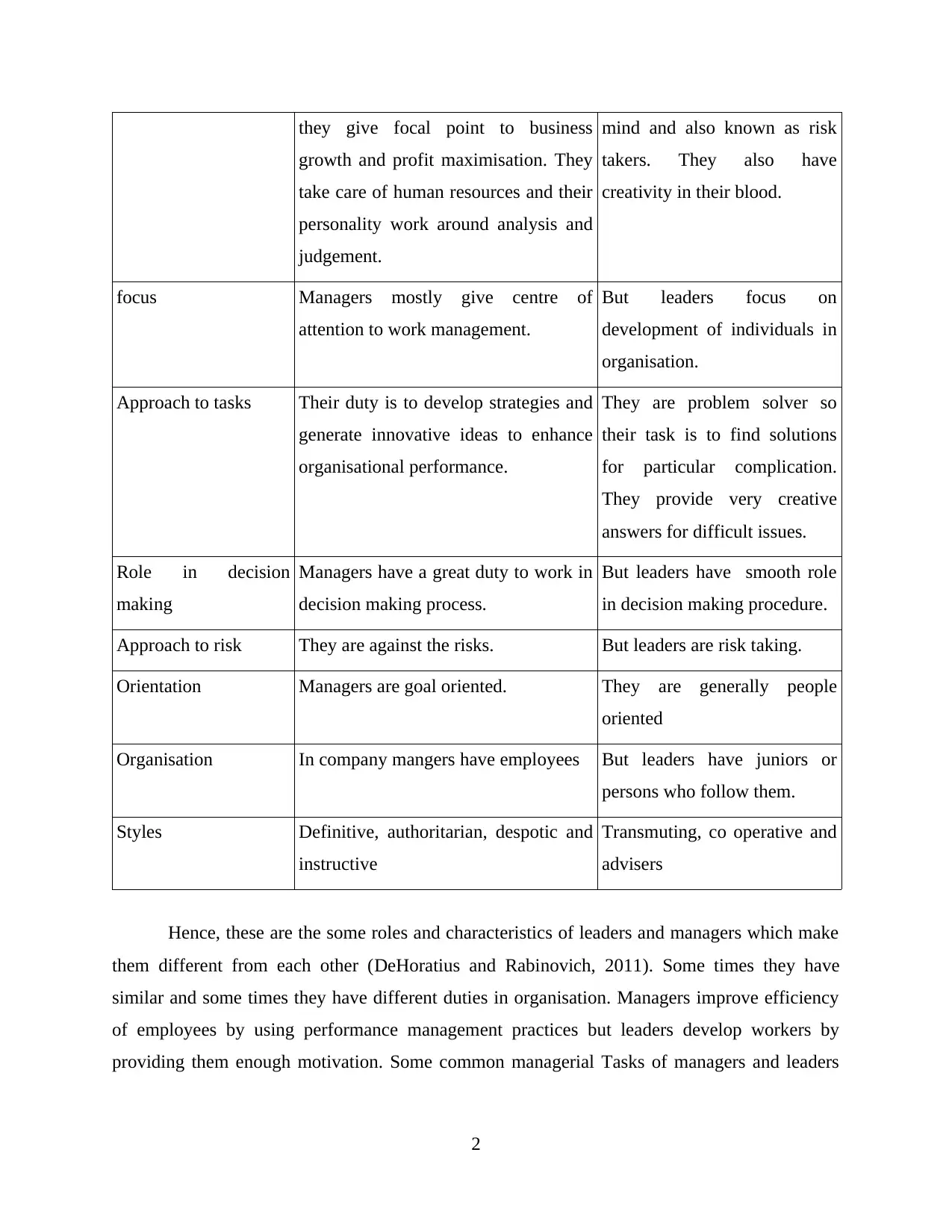
they give focal point to business
growth and profit maximisation. They
take care of human resources and their
personality work around analysis and
judgement.
mind and also known as risk
takers. They also have
creativity in their blood.
focus Managers mostly give centre of
attention to work management.
But leaders focus on
development of individuals in
organisation.
Approach to tasks Their duty is to develop strategies and
generate innovative ideas to enhance
organisational performance.
They are problem solver so
their task is to find solutions
for particular complication.
They provide very creative
answers for difficult issues.
Role in decision
making
Managers have a great duty to work in
decision making process.
But leaders have smooth role
in decision making procedure.
Approach to risk They are against the risks. But leaders are risk taking.
Orientation Managers are goal oriented. They are generally people
oriented
Organisation In company mangers have employees But leaders have juniors or
persons who follow them.
Styles Definitive, authoritarian, despotic and
instructive
Transmuting, co operative and
advisers
Hence, these are the some roles and characteristics of leaders and managers which make
them different from each other (DeHoratius and Rabinovich, 2011). Some times they have
similar and some times they have different duties in organisation. Managers improve efficiency
of employees by using performance management practices but leaders develop workers by
providing them enough motivation. Some common managerial Tasks of managers and leaders
2
growth and profit maximisation. They
take care of human resources and their
personality work around analysis and
judgement.
mind and also known as risk
takers. They also have
creativity in their blood.
focus Managers mostly give centre of
attention to work management.
But leaders focus on
development of individuals in
organisation.
Approach to tasks Their duty is to develop strategies and
generate innovative ideas to enhance
organisational performance.
They are problem solver so
their task is to find solutions
for particular complication.
They provide very creative
answers for difficult issues.
Role in decision
making
Managers have a great duty to work in
decision making process.
But leaders have smooth role
in decision making procedure.
Approach to risk They are against the risks. But leaders are risk taking.
Orientation Managers are goal oriented. They are generally people
oriented
Organisation In company mangers have employees But leaders have juniors or
persons who follow them.
Styles Definitive, authoritarian, despotic and
instructive
Transmuting, co operative and
advisers
Hence, these are the some roles and characteristics of leaders and managers which make
them different from each other (DeHoratius and Rabinovich, 2011). Some times they have
similar and some times they have different duties in organisation. Managers improve efficiency
of employees by using performance management practices but leaders develop workers by
providing them enough motivation. Some common managerial Tasks of managers and leaders
2
Paraphrase This Document
Need a fresh take? Get an instant paraphrase of this document with our AI Paraphraser
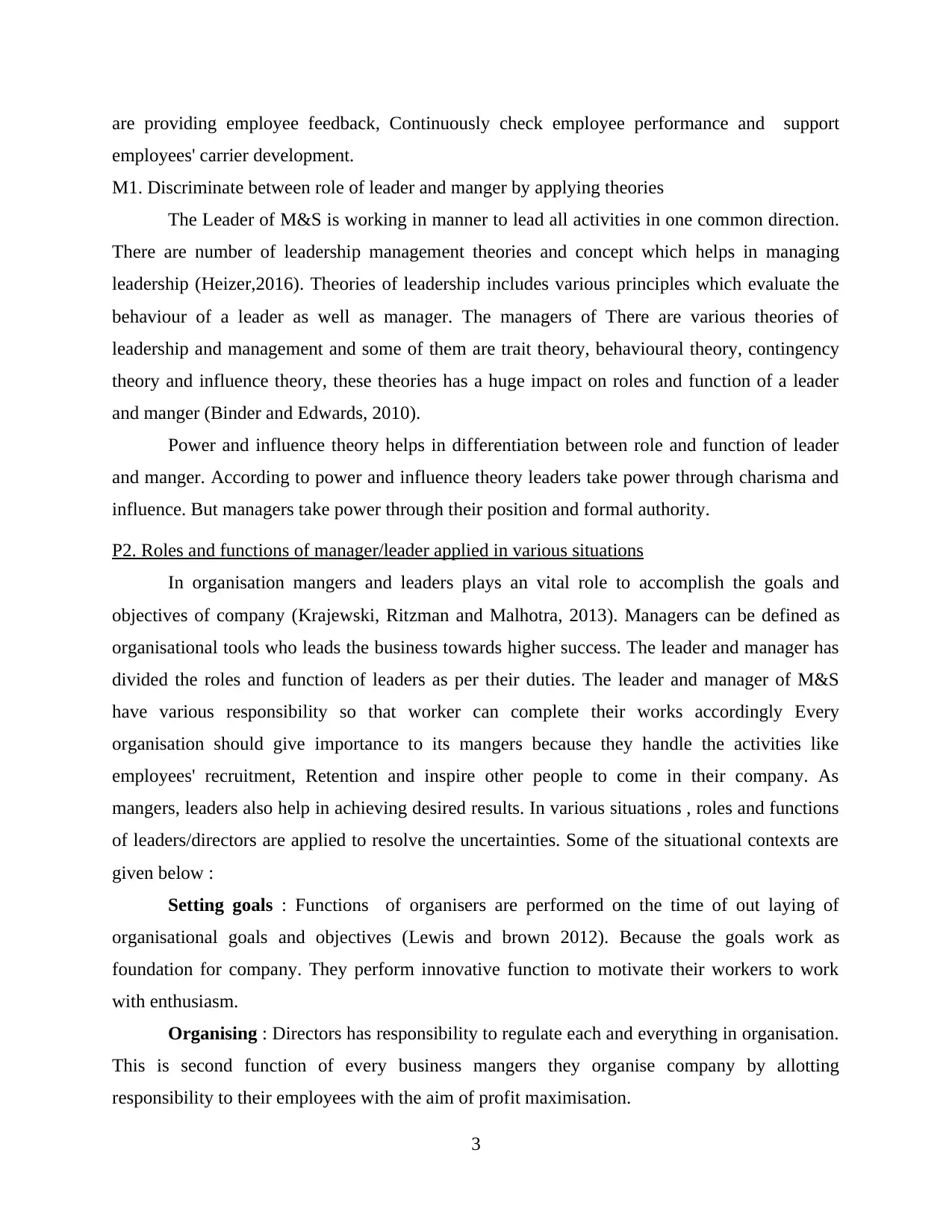
are providing employee feedback, Continuously check employee performance and support
employees' carrier development.
M1. Discriminate between role of leader and manger by applying theories
The Leader of M&S is working in manner to lead all activities in one common direction.
There are number of leadership management theories and concept which helps in managing
leadership (Heizer,2016). Theories of leadership includes various principles which evaluate the
behaviour of a leader as well as manager. The managers of There are various theories of
leadership and management and some of them are trait theory, behavioural theory, contingency
theory and influence theory, these theories has a huge impact on roles and function of a leader
and manger (Binder and Edwards, 2010).
Power and influence theory helps in differentiation between role and function of leader
and manger. According to power and influence theory leaders take power through charisma and
influence. But managers take power through their position and formal authority.
P2. Roles and functions of manager/leader applied in various situations
In organisation mangers and leaders plays an vital role to accomplish the goals and
objectives of company (Krajewski, Ritzman and Malhotra, 2013). Managers can be defined as
organisational tools who leads the business towards higher success. The leader and manager has
divided the roles and function of leaders as per their duties. The leader and manager of M&S
have various responsibility so that worker can complete their works accordingly Every
organisation should give importance to its mangers because they handle the activities like
employees' recruitment, Retention and inspire other people to come in their company. As
mangers, leaders also help in achieving desired results. In various situations , roles and functions
of leaders/directors are applied to resolve the uncertainties. Some of the situational contexts are
given below :
Setting goals : Functions of organisers are performed on the time of out laying of
organisational goals and objectives (Lewis and brown 2012). Because the goals work as
foundation for company. They perform innovative function to motivate their workers to work
with enthusiasm.
Organising : Directors has responsibility to regulate each and everything in organisation.
This is second function of every business mangers they organise company by allotting
responsibility to their employees with the aim of profit maximisation.
3
employees' carrier development.
M1. Discriminate between role of leader and manger by applying theories
The Leader of M&S is working in manner to lead all activities in one common direction.
There are number of leadership management theories and concept which helps in managing
leadership (Heizer,2016). Theories of leadership includes various principles which evaluate the
behaviour of a leader as well as manager. The managers of There are various theories of
leadership and management and some of them are trait theory, behavioural theory, contingency
theory and influence theory, these theories has a huge impact on roles and function of a leader
and manger (Binder and Edwards, 2010).
Power and influence theory helps in differentiation between role and function of leader
and manger. According to power and influence theory leaders take power through charisma and
influence. But managers take power through their position and formal authority.
P2. Roles and functions of manager/leader applied in various situations
In organisation mangers and leaders plays an vital role to accomplish the goals and
objectives of company (Krajewski, Ritzman and Malhotra, 2013). Managers can be defined as
organisational tools who leads the business towards higher success. The leader and manager has
divided the roles and function of leaders as per their duties. The leader and manager of M&S
have various responsibility so that worker can complete their works accordingly Every
organisation should give importance to its mangers because they handle the activities like
employees' recruitment, Retention and inspire other people to come in their company. As
mangers, leaders also help in achieving desired results. In various situations , roles and functions
of leaders/directors are applied to resolve the uncertainties. Some of the situational contexts are
given below :
Setting goals : Functions of organisers are performed on the time of out laying of
organisational goals and objectives (Lewis and brown 2012). Because the goals work as
foundation for company. They perform innovative function to motivate their workers to work
with enthusiasm.
Organising : Directors has responsibility to regulate each and everything in organisation.
This is second function of every business mangers they organise company by allotting
responsibility to their employees with the aim of profit maximisation.
3
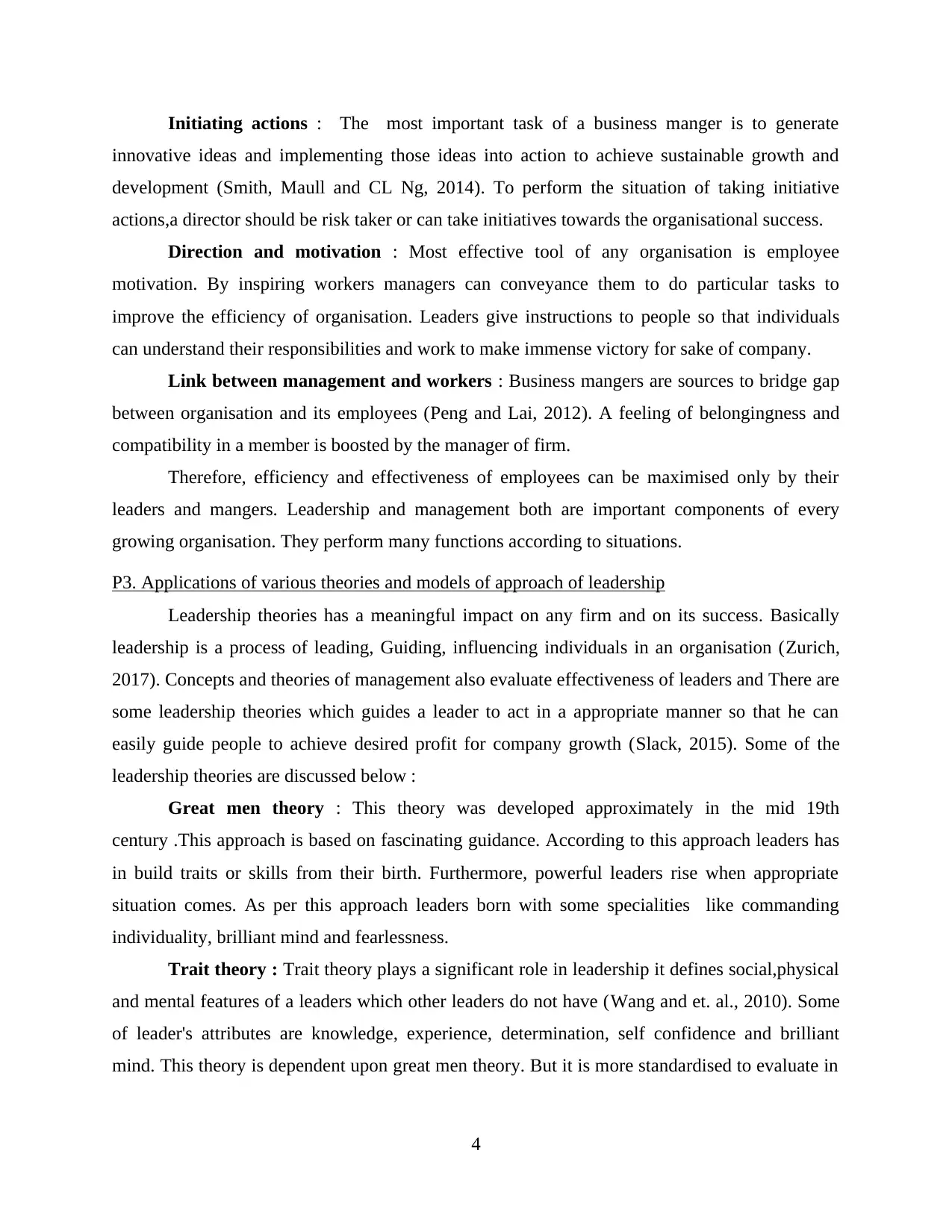
Initiating actions : The most important task of a business manger is to generate
innovative ideas and implementing those ideas into action to achieve sustainable growth and
development (Smith, Maull and CL Ng, 2014). To perform the situation of taking initiative
actions,a director should be risk taker or can take initiatives towards the organisational success.
Direction and motivation : Most effective tool of any organisation is employee
motivation. By inspiring workers managers can conveyance them to do particular tasks to
improve the efficiency of organisation. Leaders give instructions to people so that individuals
can understand their responsibilities and work to make immense victory for sake of company.
Link between management and workers : Business mangers are sources to bridge gap
between organisation and its employees (Peng and Lai, 2012). A feeling of belongingness and
compatibility in a member is boosted by the manager of firm.
Therefore, efficiency and effectiveness of employees can be maximised only by their
leaders and mangers. Leadership and management both are important components of every
growing organisation. They perform many functions according to situations.
P3. Applications of various theories and models of approach of leadership
Leadership theories has a meaningful impact on any firm and on its success. Basically
leadership is a process of leading, Guiding, influencing individuals in an organisation (Zurich,
2017). Concepts and theories of management also evaluate effectiveness of leaders and There are
some leadership theories which guides a leader to act in a appropriate manner so that he can
easily guide people to achieve desired profit for company growth (Slack, 2015). Some of the
leadership theories are discussed below :
Great men theory : This theory was developed approximately in the mid 19th
century .This approach is based on fascinating guidance. According to this approach leaders has
in build traits or skills from their birth. Furthermore, powerful leaders rise when appropriate
situation comes. As per this approach leaders born with some specialities like commanding
individuality, brilliant mind and fearlessness.
Trait theory : Trait theory plays a significant role in leadership it defines social,physical
and mental features of a leaders which other leaders do not have (Wang and et. al., 2010). Some
of leader's attributes are knowledge, experience, determination, self confidence and brilliant
mind. This theory is dependent upon great men theory. But it is more standardised to evaluate in
4
innovative ideas and implementing those ideas into action to achieve sustainable growth and
development (Smith, Maull and CL Ng, 2014). To perform the situation of taking initiative
actions,a director should be risk taker or can take initiatives towards the organisational success.
Direction and motivation : Most effective tool of any organisation is employee
motivation. By inspiring workers managers can conveyance them to do particular tasks to
improve the efficiency of organisation. Leaders give instructions to people so that individuals
can understand their responsibilities and work to make immense victory for sake of company.
Link between management and workers : Business mangers are sources to bridge gap
between organisation and its employees (Peng and Lai, 2012). A feeling of belongingness and
compatibility in a member is boosted by the manager of firm.
Therefore, efficiency and effectiveness of employees can be maximised only by their
leaders and mangers. Leadership and management both are important components of every
growing organisation. They perform many functions according to situations.
P3. Applications of various theories and models of approach of leadership
Leadership theories has a meaningful impact on any firm and on its success. Basically
leadership is a process of leading, Guiding, influencing individuals in an organisation (Zurich,
2017). Concepts and theories of management also evaluate effectiveness of leaders and There are
some leadership theories which guides a leader to act in a appropriate manner so that he can
easily guide people to achieve desired profit for company growth (Slack, 2015). Some of the
leadership theories are discussed below :
Great men theory : This theory was developed approximately in the mid 19th
century .This approach is based on fascinating guidance. According to this approach leaders has
in build traits or skills from their birth. Furthermore, powerful leaders rise when appropriate
situation comes. As per this approach leaders born with some specialities like commanding
individuality, brilliant mind and fearlessness.
Trait theory : Trait theory plays a significant role in leadership it defines social,physical
and mental features of a leaders which other leaders do not have (Wang and et. al., 2010). Some
of leader's attributes are knowledge, experience, determination, self confidence and brilliant
mind. This theory is dependent upon great men theory. But it is more standardised to evaluate in
4
⊘ This is a preview!⊘
Do you want full access?
Subscribe today to unlock all pages.

Trusted by 1+ million students worldwide
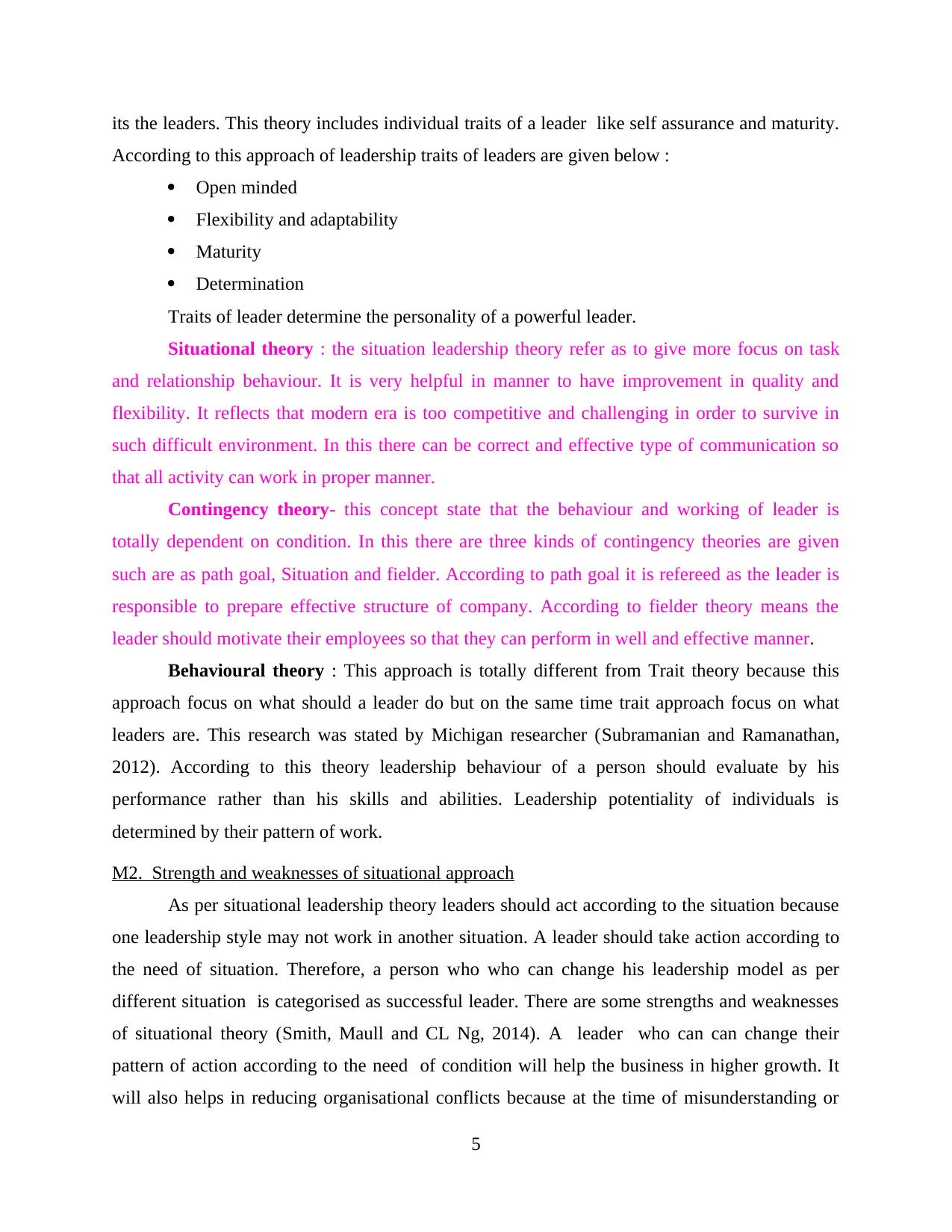
its the leaders. This theory includes individual traits of a leader like self assurance and maturity.
According to this approach of leadership traits of leaders are given below :
Open minded
Flexibility and adaptability
Maturity
Determination
Traits of leader determine the personality of a powerful leader.
Situational theory : the situation leadership theory refer as to give more focus on task
and relationship behaviour. It is very helpful in manner to have improvement in quality and
flexibility. It reflects that modern era is too competitive and challenging in order to survive in
such difficult environment. In this there can be correct and effective type of communication so
that all activity can work in proper manner.
Contingency theory- this concept state that the behaviour and working of leader is
totally dependent on condition. In this there are three kinds of contingency theories are given
such are as path goal, Situation and fielder. According to path goal it is refereed as the leader is
responsible to prepare effective structure of company. According to fielder theory means the
leader should motivate their employees so that they can perform in well and effective manner.
Behavioural theory : This approach is totally different from Trait theory because this
approach focus on what should a leader do but on the same time trait approach focus on what
leaders are. This research was stated by Michigan researcher (Subramanian and Ramanathan,
2012). According to this theory leadership behaviour of a person should evaluate by his
performance rather than his skills and abilities. Leadership potentiality of individuals is
determined by their pattern of work.
M2. Strength and weaknesses of situational approach
As per situational leadership theory leaders should act according to the situation because
one leadership style may not work in another situation. A leader should take action according to
the need of situation. Therefore, a person who who can change his leadership model as per
different situation is categorised as successful leader. There are some strengths and weaknesses
of situational theory (Smith, Maull and CL Ng, 2014). A leader who can can change their
pattern of action according to the need of condition will help the business in higher growth. It
will also helps in reducing organisational conflicts because at the time of misunderstanding or
5
According to this approach of leadership traits of leaders are given below :
Open minded
Flexibility and adaptability
Maturity
Determination
Traits of leader determine the personality of a powerful leader.
Situational theory : the situation leadership theory refer as to give more focus on task
and relationship behaviour. It is very helpful in manner to have improvement in quality and
flexibility. It reflects that modern era is too competitive and challenging in order to survive in
such difficult environment. In this there can be correct and effective type of communication so
that all activity can work in proper manner.
Contingency theory- this concept state that the behaviour and working of leader is
totally dependent on condition. In this there are three kinds of contingency theories are given
such are as path goal, Situation and fielder. According to path goal it is refereed as the leader is
responsible to prepare effective structure of company. According to fielder theory means the
leader should motivate their employees so that they can perform in well and effective manner.
Behavioural theory : This approach is totally different from Trait theory because this
approach focus on what should a leader do but on the same time trait approach focus on what
leaders are. This research was stated by Michigan researcher (Subramanian and Ramanathan,
2012). According to this theory leadership behaviour of a person should evaluate by his
performance rather than his skills and abilities. Leadership potentiality of individuals is
determined by their pattern of work.
M2. Strength and weaknesses of situational approach
As per situational leadership theory leaders should act according to the situation because
one leadership style may not work in another situation. A leader should take action according to
the need of situation. Therefore, a person who who can change his leadership model as per
different situation is categorised as successful leader. There are some strengths and weaknesses
of situational theory (Smith, Maull and CL Ng, 2014). A leader who can can change their
pattern of action according to the need of condition will help the business in higher growth. It
will also helps in reducing organisational conflicts because at the time of misunderstanding or
5
Paraphrase This Document
Need a fresh take? Get an instant paraphrase of this document with our AI Paraphraser
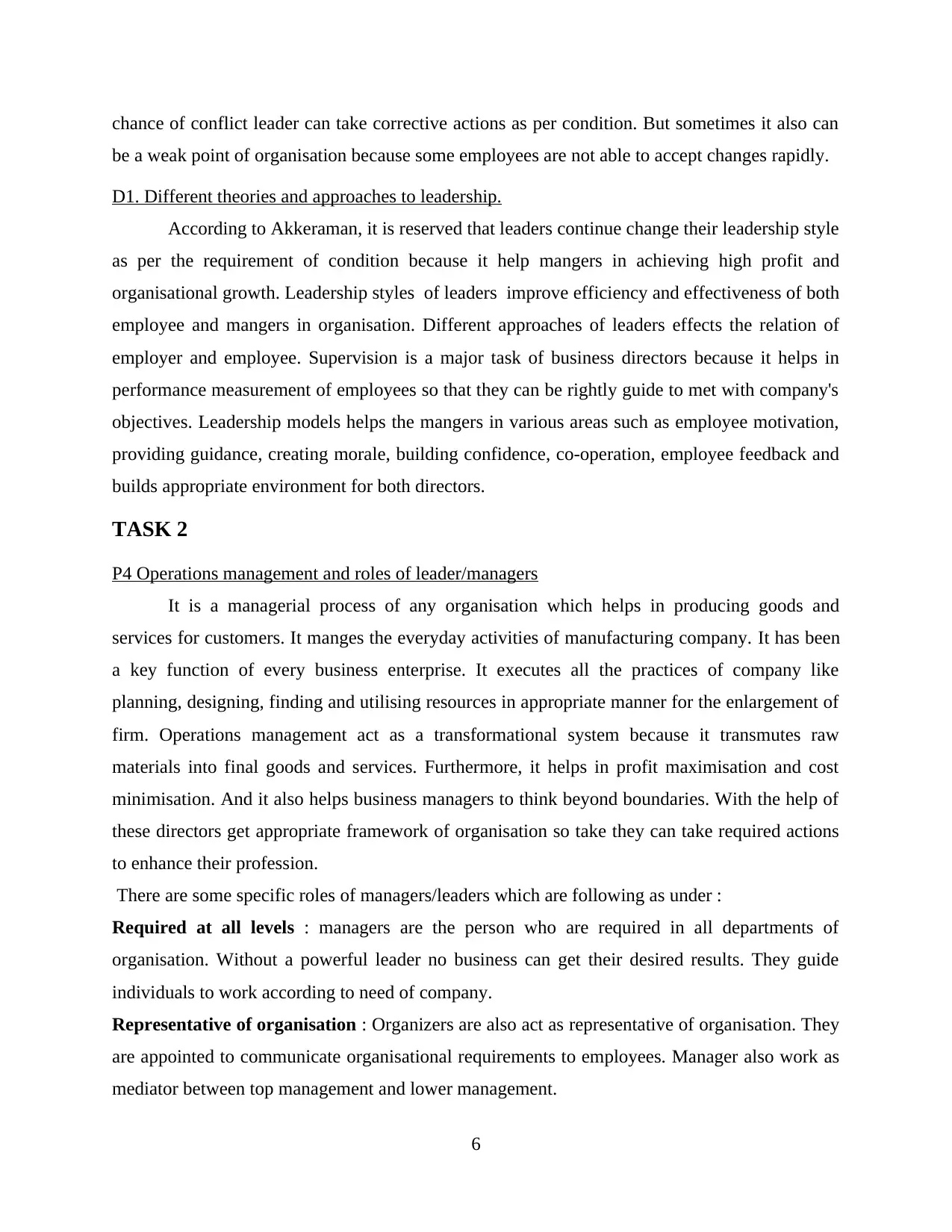
chance of conflict leader can take corrective actions as per condition. But sometimes it also can
be a weak point of organisation because some employees are not able to accept changes rapidly.
D1. Different theories and approaches to leadership.
According to Akkeraman, it is reserved that leaders continue change their leadership style
as per the requirement of condition because it help mangers in achieving high profit and
organisational growth. Leadership styles of leaders improve efficiency and effectiveness of both
employee and mangers in organisation. Different approaches of leaders effects the relation of
employer and employee. Supervision is a major task of business directors because it helps in
performance measurement of employees so that they can be rightly guide to met with company's
objectives. Leadership models helps the mangers in various areas such as employee motivation,
providing guidance, creating morale, building confidence, co-operation, employee feedback and
builds appropriate environment for both directors.
TASK 2
P4 Operations management and roles of leader/managers
It is a managerial process of any organisation which helps in producing goods and
services for customers. It manges the everyday activities of manufacturing company. It has been
a key function of every business enterprise. It executes all the practices of company like
planning, designing, finding and utilising resources in appropriate manner for the enlargement of
firm. Operations management act as a transformational system because it transmutes raw
materials into final goods and services. Furthermore, it helps in profit maximisation and cost
minimisation. And it also helps business managers to think beyond boundaries. With the help of
these directors get appropriate framework of organisation so take they can take required actions
to enhance their profession.
There are some specific roles of managers/leaders which are following as under :
Required at all levels : managers are the person who are required in all departments of
organisation. Without a powerful leader no business can get their desired results. They guide
individuals to work according to need of company.
Representative of organisation : Organizers are also act as representative of organisation. They
are appointed to communicate organisational requirements to employees. Manager also work as
mediator between top management and lower management.
6
be a weak point of organisation because some employees are not able to accept changes rapidly.
D1. Different theories and approaches to leadership.
According to Akkeraman, it is reserved that leaders continue change their leadership style
as per the requirement of condition because it help mangers in achieving high profit and
organisational growth. Leadership styles of leaders improve efficiency and effectiveness of both
employee and mangers in organisation. Different approaches of leaders effects the relation of
employer and employee. Supervision is a major task of business directors because it helps in
performance measurement of employees so that they can be rightly guide to met with company's
objectives. Leadership models helps the mangers in various areas such as employee motivation,
providing guidance, creating morale, building confidence, co-operation, employee feedback and
builds appropriate environment for both directors.
TASK 2
P4 Operations management and roles of leader/managers
It is a managerial process of any organisation which helps in producing goods and
services for customers. It manges the everyday activities of manufacturing company. It has been
a key function of every business enterprise. It executes all the practices of company like
planning, designing, finding and utilising resources in appropriate manner for the enlargement of
firm. Operations management act as a transformational system because it transmutes raw
materials into final goods and services. Furthermore, it helps in profit maximisation and cost
minimisation. And it also helps business managers to think beyond boundaries. With the help of
these directors get appropriate framework of organisation so take they can take required actions
to enhance their profession.
There are some specific roles of managers/leaders which are following as under :
Required at all levels : managers are the person who are required in all departments of
organisation. Without a powerful leader no business can get their desired results. They guide
individuals to work according to need of company.
Representative of organisation : Organizers are also act as representative of organisation. They
are appointed to communicate organisational requirements to employees. Manager also work as
mediator between top management and lower management.
6
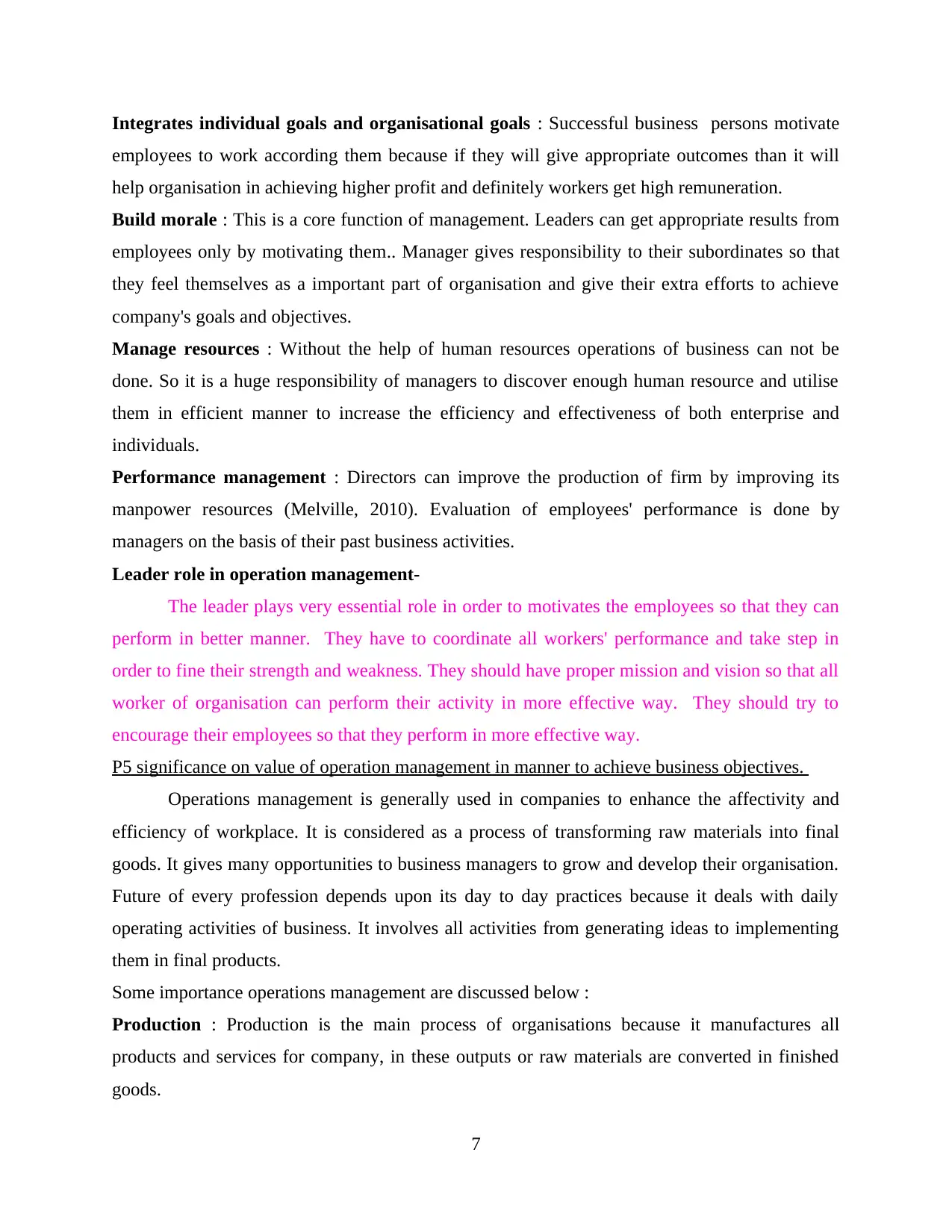
Integrates individual goals and organisational goals : Successful business persons motivate
employees to work according them because if they will give appropriate outcomes than it will
help organisation in achieving higher profit and definitely workers get high remuneration.
Build morale : This is a core function of management. Leaders can get appropriate results from
employees only by motivating them.. Manager gives responsibility to their subordinates so that
they feel themselves as a important part of organisation and give their extra efforts to achieve
company's goals and objectives.
Manage resources : Without the help of human resources operations of business can not be
done. So it is a huge responsibility of managers to discover enough human resource and utilise
them in efficient manner to increase the efficiency and effectiveness of both enterprise and
individuals.
Performance management : Directors can improve the production of firm by improving its
manpower resources (Melville, 2010). Evaluation of employees' performance is done by
managers on the basis of their past business activities.
Leader role in operation management-
The leader plays very essential role in order to motivates the employees so that they can
perform in better manner. They have to coordinate all workers' performance and take step in
order to fine their strength and weakness. They should have proper mission and vision so that all
worker of organisation can perform their activity in more effective way. They should try to
encourage their employees so that they perform in more effective way.
P5 significance on value of operation management in manner to achieve business objectives.
Operations management is generally used in companies to enhance the affectivity and
efficiency of workplace. It is considered as a process of transforming raw materials into final
goods. It gives many opportunities to business managers to grow and develop their organisation.
Future of every profession depends upon its day to day practices because it deals with daily
operating activities of business. It involves all activities from generating ideas to implementing
them in final products.
Some importance operations management are discussed below :
Production : Production is the main process of organisations because it manufactures all
products and services for company, in these outputs or raw materials are converted in finished
goods.
7
employees to work according them because if they will give appropriate outcomes than it will
help organisation in achieving higher profit and definitely workers get high remuneration.
Build morale : This is a core function of management. Leaders can get appropriate results from
employees only by motivating them.. Manager gives responsibility to their subordinates so that
they feel themselves as a important part of organisation and give their extra efforts to achieve
company's goals and objectives.
Manage resources : Without the help of human resources operations of business can not be
done. So it is a huge responsibility of managers to discover enough human resource and utilise
them in efficient manner to increase the efficiency and effectiveness of both enterprise and
individuals.
Performance management : Directors can improve the production of firm by improving its
manpower resources (Melville, 2010). Evaluation of employees' performance is done by
managers on the basis of their past business activities.
Leader role in operation management-
The leader plays very essential role in order to motivates the employees so that they can
perform in better manner. They have to coordinate all workers' performance and take step in
order to fine their strength and weakness. They should have proper mission and vision so that all
worker of organisation can perform their activity in more effective way. They should try to
encourage their employees so that they perform in more effective way.
P5 significance on value of operation management in manner to achieve business objectives.
Operations management is generally used in companies to enhance the affectivity and
efficiency of workplace. It is considered as a process of transforming raw materials into final
goods. It gives many opportunities to business managers to grow and develop their organisation.
Future of every profession depends upon its day to day practices because it deals with daily
operating activities of business. It involves all activities from generating ideas to implementing
them in final products.
Some importance operations management are discussed below :
Production : Production is the main process of organisations because it manufactures all
products and services for company, in these outputs or raw materials are converted in finished
goods.
7
⊘ This is a preview!⊘
Do you want full access?
Subscribe today to unlock all pages.

Trusted by 1+ million students worldwide
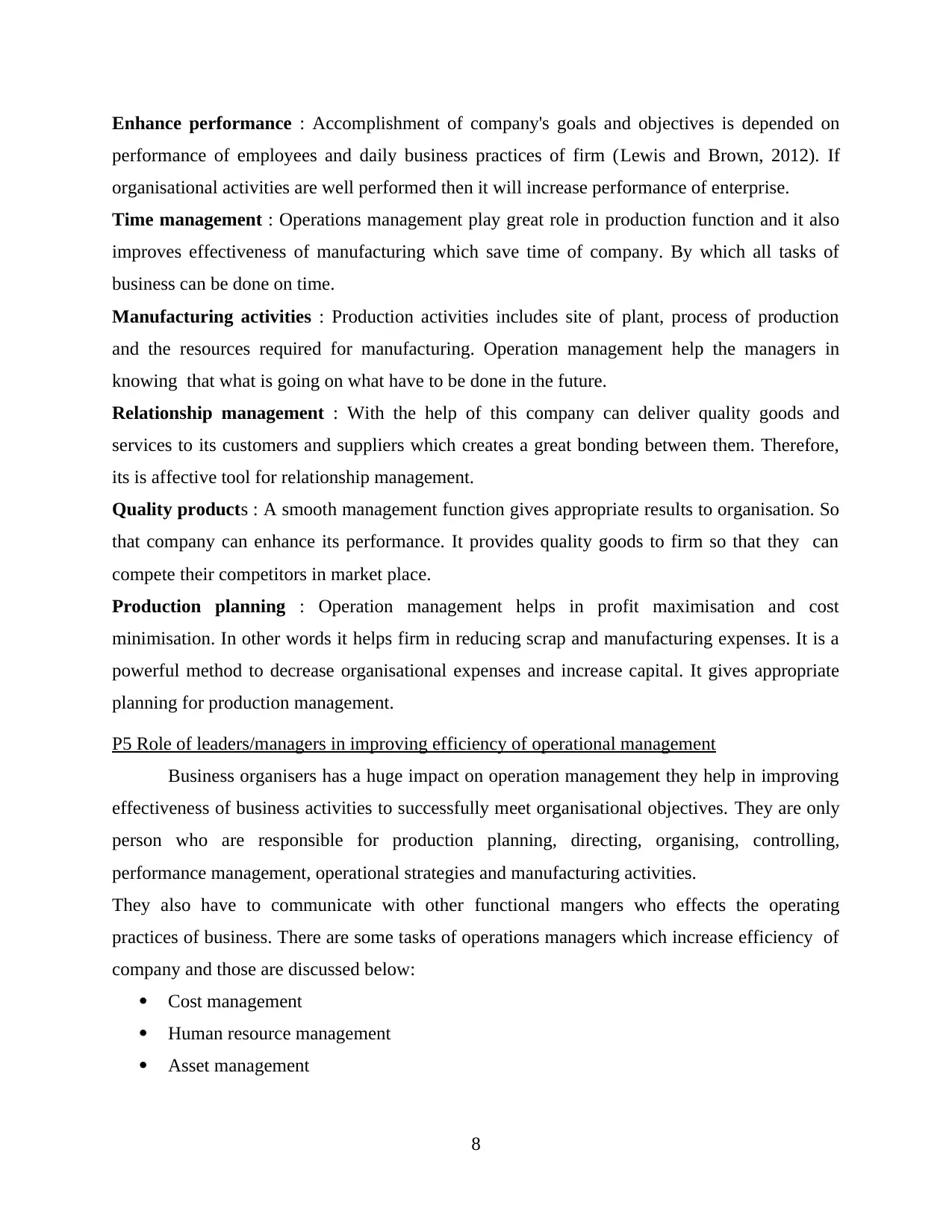
Enhance performance : Accomplishment of company's goals and objectives is depended on
performance of employees and daily business practices of firm (Lewis and Brown, 2012). If
organisational activities are well performed then it will increase performance of enterprise.
Time management : Operations management play great role in production function and it also
improves effectiveness of manufacturing which save time of company. By which all tasks of
business can be done on time.
Manufacturing activities : Production activities includes site of plant, process of production
and the resources required for manufacturing. Operation management help the managers in
knowing that what is going on what have to be done in the future.
Relationship management : With the help of this company can deliver quality goods and
services to its customers and suppliers which creates a great bonding between them. Therefore,
its is affective tool for relationship management.
Quality products : A smooth management function gives appropriate results to organisation. So
that company can enhance its performance. It provides quality goods to firm so that they can
compete their competitors in market place.
Production planning : Operation management helps in profit maximisation and cost
minimisation. In other words it helps firm in reducing scrap and manufacturing expenses. It is a
powerful method to decrease organisational expenses and increase capital. It gives appropriate
planning for production management.
P5 Role of leaders/managers in improving efficiency of operational management
Business organisers has a huge impact on operation management they help in improving
effectiveness of business activities to successfully meet organisational objectives. They are only
person who are responsible for production planning, directing, organising, controlling,
performance management, operational strategies and manufacturing activities.
They also have to communicate with other functional mangers who effects the operating
practices of business. There are some tasks of operations managers which increase efficiency of
company and those are discussed below:
Cost management
Human resource management
Asset management
8
performance of employees and daily business practices of firm (Lewis and Brown, 2012). If
organisational activities are well performed then it will increase performance of enterprise.
Time management : Operations management play great role in production function and it also
improves effectiveness of manufacturing which save time of company. By which all tasks of
business can be done on time.
Manufacturing activities : Production activities includes site of plant, process of production
and the resources required for manufacturing. Operation management help the managers in
knowing that what is going on what have to be done in the future.
Relationship management : With the help of this company can deliver quality goods and
services to its customers and suppliers which creates a great bonding between them. Therefore,
its is affective tool for relationship management.
Quality products : A smooth management function gives appropriate results to organisation. So
that company can enhance its performance. It provides quality goods to firm so that they can
compete their competitors in market place.
Production planning : Operation management helps in profit maximisation and cost
minimisation. In other words it helps firm in reducing scrap and manufacturing expenses. It is a
powerful method to decrease organisational expenses and increase capital. It gives appropriate
planning for production management.
P5 Role of leaders/managers in improving efficiency of operational management
Business organisers has a huge impact on operation management they help in improving
effectiveness of business activities to successfully meet organisational objectives. They are only
person who are responsible for production planning, directing, organising, controlling,
performance management, operational strategies and manufacturing activities.
They also have to communicate with other functional mangers who effects the operating
practices of business. There are some tasks of operations managers which increase efficiency of
company and those are discussed below:
Cost management
Human resource management
Asset management
8
Paraphrase This Document
Need a fresh take? Get an instant paraphrase of this document with our AI Paraphraser
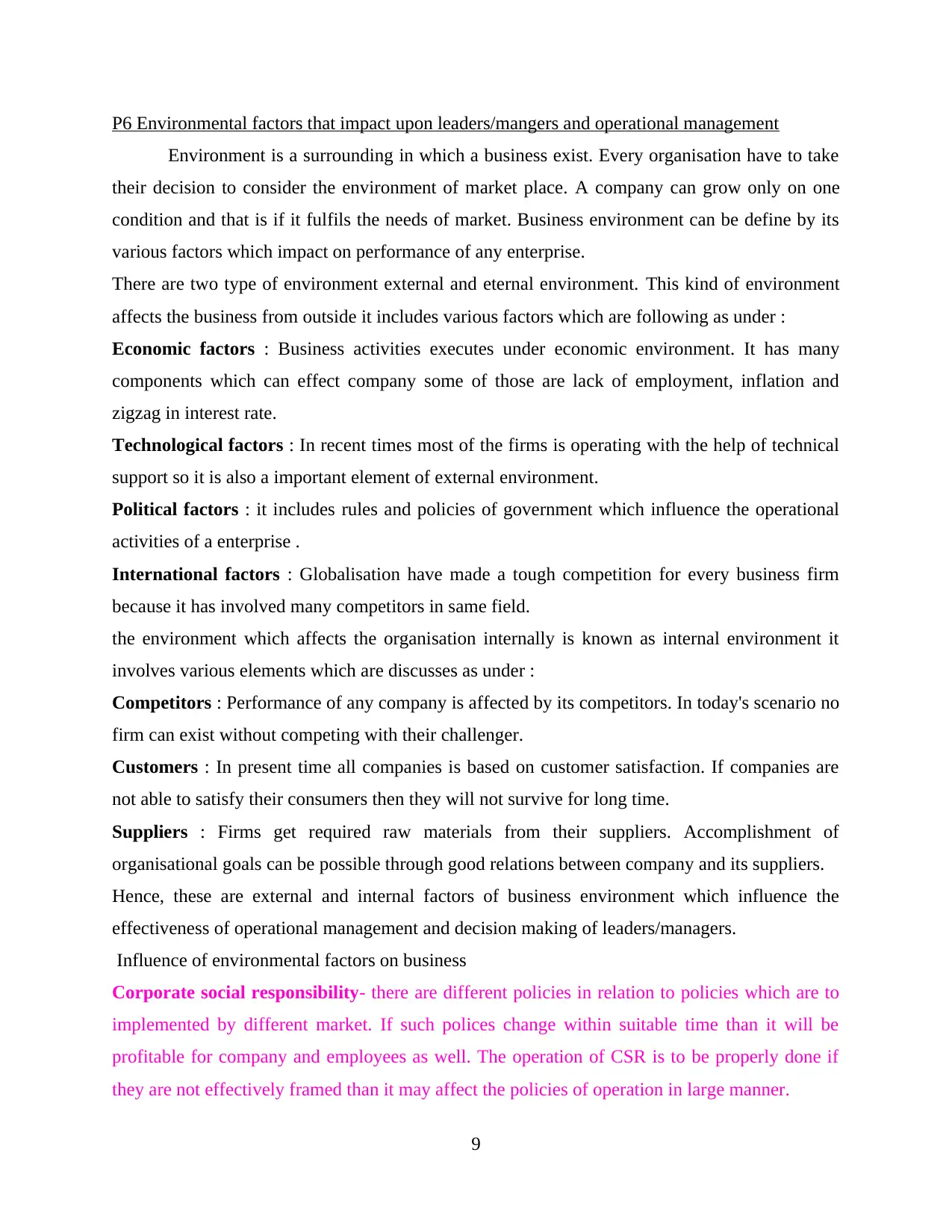
P6 Environmental factors that impact upon leaders/mangers and operational management
Environment is a surrounding in which a business exist. Every organisation have to take
their decision to consider the environment of market place. A company can grow only on one
condition and that is if it fulfils the needs of market. Business environment can be define by its
various factors which impact on performance of any enterprise.
There are two type of environment external and eternal environment. This kind of environment
affects the business from outside it includes various factors which are following as under :
Economic factors : Business activities executes under economic environment. It has many
components which can effect company some of those are lack of employment, inflation and
zigzag in interest rate.
Technological factors : In recent times most of the firms is operating with the help of technical
support so it is also a important element of external environment.
Political factors : it includes rules and policies of government which influence the operational
activities of a enterprise .
International factors : Globalisation have made a tough competition for every business firm
because it has involved many competitors in same field.
the environment which affects the organisation internally is known as internal environment it
involves various elements which are discusses as under :
Competitors : Performance of any company is affected by its competitors. In today's scenario no
firm can exist without competing with their challenger.
Customers : In present time all companies is based on customer satisfaction. If companies are
not able to satisfy their consumers then they will not survive for long time.
Suppliers : Firms get required raw materials from their suppliers. Accomplishment of
organisational goals can be possible through good relations between company and its suppliers.
Hence, these are external and internal factors of business environment which influence the
effectiveness of operational management and decision making of leaders/managers.
Influence of environmental factors on business
Corporate social responsibility- there are different policies in relation to policies which are to
implemented by different market. If such polices change within suitable time than it will be
profitable for company and employees as well. The operation of CSR is to be properly done if
they are not effectively framed than it may affect the policies of operation in large manner.
9
Environment is a surrounding in which a business exist. Every organisation have to take
their decision to consider the environment of market place. A company can grow only on one
condition and that is if it fulfils the needs of market. Business environment can be define by its
various factors which impact on performance of any enterprise.
There are two type of environment external and eternal environment. This kind of environment
affects the business from outside it includes various factors which are following as under :
Economic factors : Business activities executes under economic environment. It has many
components which can effect company some of those are lack of employment, inflation and
zigzag in interest rate.
Technological factors : In recent times most of the firms is operating with the help of technical
support so it is also a important element of external environment.
Political factors : it includes rules and policies of government which influence the operational
activities of a enterprise .
International factors : Globalisation have made a tough competition for every business firm
because it has involved many competitors in same field.
the environment which affects the organisation internally is known as internal environment it
involves various elements which are discusses as under :
Competitors : Performance of any company is affected by its competitors. In today's scenario no
firm can exist without competing with their challenger.
Customers : In present time all companies is based on customer satisfaction. If companies are
not able to satisfy their consumers then they will not survive for long time.
Suppliers : Firms get required raw materials from their suppliers. Accomplishment of
organisational goals can be possible through good relations between company and its suppliers.
Hence, these are external and internal factors of business environment which influence the
effectiveness of operational management and decision making of leaders/managers.
Influence of environmental factors on business
Corporate social responsibility- there are different policies in relation to policies which are to
implemented by different market. If such polices change within suitable time than it will be
profitable for company and employees as well. The operation of CSR is to be properly done if
they are not effectively framed than it may affect the policies of operation in large manner.
9
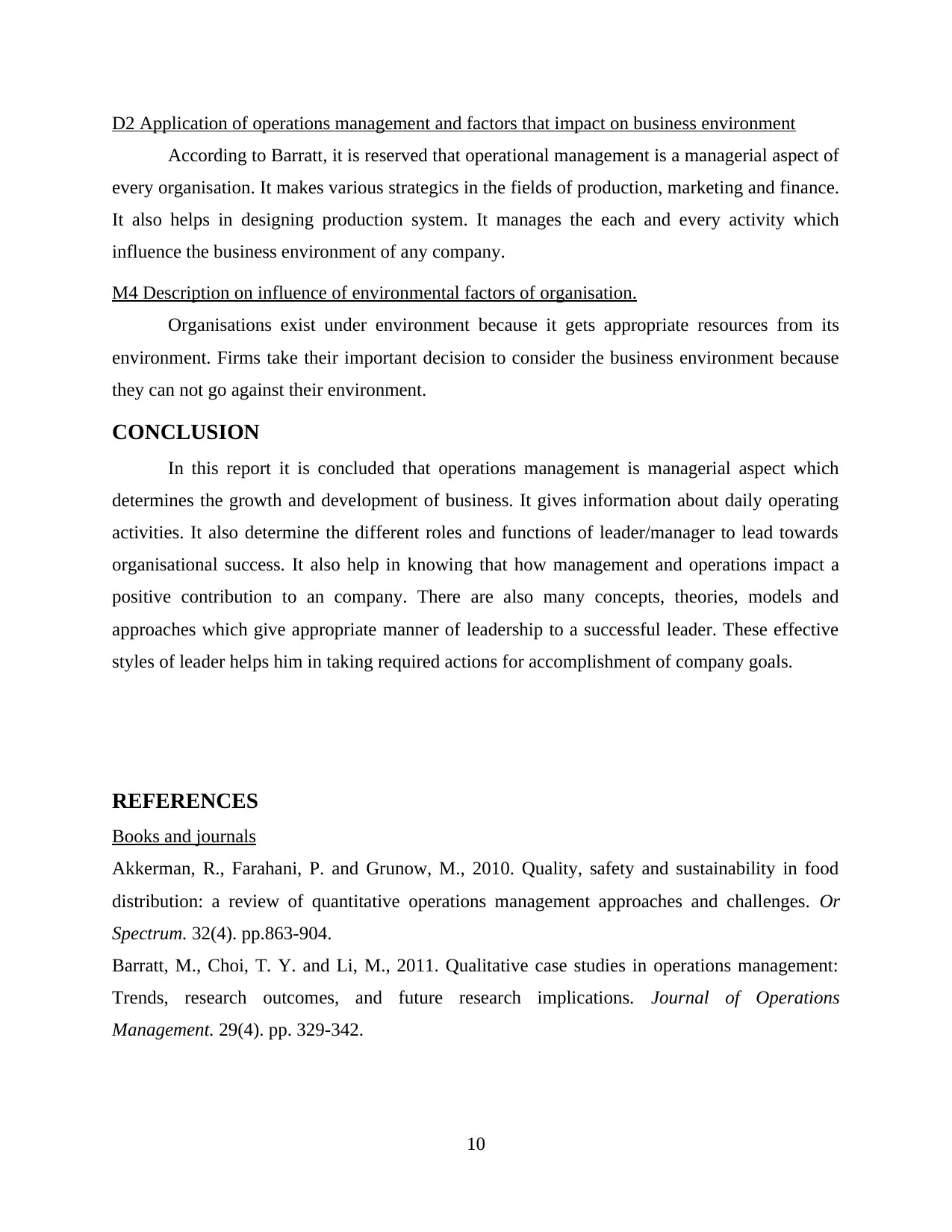
D2 Application of operations management and factors that impact on business environment
According to Barratt, it is reserved that operational management is a managerial aspect of
every organisation. It makes various strategics in the fields of production, marketing and finance.
It also helps in designing production system. It manages the each and every activity which
influence the business environment of any company.
M4 Description on influence of environmental factors of organisation.
Organisations exist under environment because it gets appropriate resources from its
environment. Firms take their important decision to consider the business environment because
they can not go against their environment.
CONCLUSION
In this report it is concluded that operations management is managerial aspect which
determines the growth and development of business. It gives information about daily operating
activities. It also determine the different roles and functions of leader/manager to lead towards
organisational success. It also help in knowing that how management and operations impact a
positive contribution to an company. There are also many concepts, theories, models and
approaches which give appropriate manner of leadership to a successful leader. These effective
styles of leader helps him in taking required actions for accomplishment of company goals.
REFERENCES
Books and journals
Akkerman, R., Farahani, P. and Grunow, M., 2010. Quality, safety and sustainability in food
distribution: a review of quantitative operations management approaches and challenges. Or
Spectrum. 32(4). pp.863-904.
Barratt, M., Choi, T. Y. and Li, M., 2011. Qualitative case studies in operations management:
Trends, research outcomes, and future research implications. Journal of Operations
Management. 29(4). pp. 329-342.
10
According to Barratt, it is reserved that operational management is a managerial aspect of
every organisation. It makes various strategics in the fields of production, marketing and finance.
It also helps in designing production system. It manages the each and every activity which
influence the business environment of any company.
M4 Description on influence of environmental factors of organisation.
Organisations exist under environment because it gets appropriate resources from its
environment. Firms take their important decision to consider the business environment because
they can not go against their environment.
CONCLUSION
In this report it is concluded that operations management is managerial aspect which
determines the growth and development of business. It gives information about daily operating
activities. It also determine the different roles and functions of leader/manager to lead towards
organisational success. It also help in knowing that how management and operations impact a
positive contribution to an company. There are also many concepts, theories, models and
approaches which give appropriate manner of leadership to a successful leader. These effective
styles of leader helps him in taking required actions for accomplishment of company goals.
REFERENCES
Books and journals
Akkerman, R., Farahani, P. and Grunow, M., 2010. Quality, safety and sustainability in food
distribution: a review of quantitative operations management approaches and challenges. Or
Spectrum. 32(4). pp.863-904.
Barratt, M., Choi, T. Y. and Li, M., 2011. Qualitative case studies in operations management:
Trends, research outcomes, and future research implications. Journal of Operations
Management. 29(4). pp. 329-342.
10
⊘ This is a preview!⊘
Do you want full access?
Subscribe today to unlock all pages.

Trusted by 1+ million students worldwide
1 out of 13
Related Documents
Your All-in-One AI-Powered Toolkit for Academic Success.
+13062052269
info@desklib.com
Available 24*7 on WhatsApp / Email
![[object Object]](/_next/static/media/star-bottom.7253800d.svg)
Unlock your academic potential
Copyright © 2020–2026 A2Z Services. All Rights Reserved. Developed and managed by ZUCOL.





